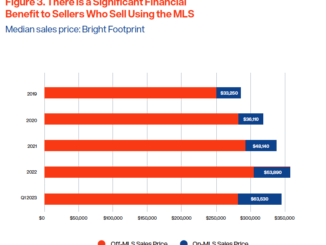
The nation’s second largest multiple listing service, Bright MLS, will begin allowing listing agents to put in a blanket offer of compensation for buyer brokers of zero dollars or more, starting on August 9.
This change appears to possibly diverge from a National Association of Realtors rule, which states that listing agents must make an offer of cooperative compensation to buyer brokers in order to list a property on the MLS.
While Bright MLS, which serves clients in Delaware, Pennsylvania, Maryland, Virginia, New Jersey, Washington, D.C., and West Virginia and represents 42 Realtor association, acknowledges that this is a small change, as previously the lowest amount allowed was one cent, it says this is a large change in terms of transparency.
“We are making this small change to underscore the complete flexibility of Bright subscribers to engage in transparent negotiations with their clients,” the firm wrote in an announcement on its website. “Bright’s MLS supports the most efficient marketplace by making property information widely and transparently available, and by facilitating blanket offers of cooperative compensation available to all buyer brokers on an impartial basis.”
The MLS noted that this change does not impact its impartial system of offers of cooperative compensation, and that offers of compensation remain negotiable and at the discretion of the home seller.
“Bright has always offered flexibility and has never specified a cooperative compensation amount,” the announcement states. “Sellers could agree to have their broker enter as little as one cent in the compensation fields, which was as close to zero as one could get. With this update, a listing agent will continue to be able to enter the cooperative compensation amount agreed upon with their seller client, from zero and up, and continue to negotiate compensation at their client’s direction.”
In an email, a spokesperson for Bright MLS said the MLS does not anticipate this impacting its relationship with NAR.
“Bright is making an independent business decision responsive to the needs of our subscribers – and the consumers they serve,” the statement read.
In addition, NAR said it supports Bright MLS’ decision.
“Bright’s view is consistent with the purpose of NAR’s policies, which are designed to ensure information is efficiently distributed to facilitate the transaction of real estate to the benefit of buyers and sellers. So long as cooperating brokers are aware of the offerings made by listing brokers, that purpose is achieved. NAR has long said listing brokers and their clients are the ones who determine the amount and makeup of the offer to cooperating brokers,” Mantill Williams, NAR’s vice president of communications, wrote in an email. “Practically speaking, the difference between one penny and $0 is negligible, and regardless, those offers are always negotiable. These policies ensure brokers are efficiently sharing information they and their clients need through their local, independent broker marketplaces. Without these policies, brokerages would not know important information about listings and they would have to rely on piecemeal information collected in inefficient ways that could negatively affect their ability to serve their clients and ultimately the U.S. economy.”
With three class action lawsuits — Nosalek, Burnett, and Moehrl — currently progressing through the courts, buyer broker compensation has been a hot topic. Bright MLS is currently listed as one of the 20 MLS co-conspirators in the Moehrl lawsuit, named after its lead plaintiff. The Moehrl suit is the largest of the three cases and defendants include NAR, Anywhere Real Estate, HomeServices of America, RE/MAX and Keller Williams.
MLS Property Information Network (MLS PIN), which serves clients in the New England area, recently signed off on a settlement in the Nosalek lawsuit in which it agreed to pay $3 million and to stop requiring sellers to offer buyer broker compensation. Unlike Bright MLS, MLS PIN is owned by broker owners and does not have to adhere to NAR rules.



